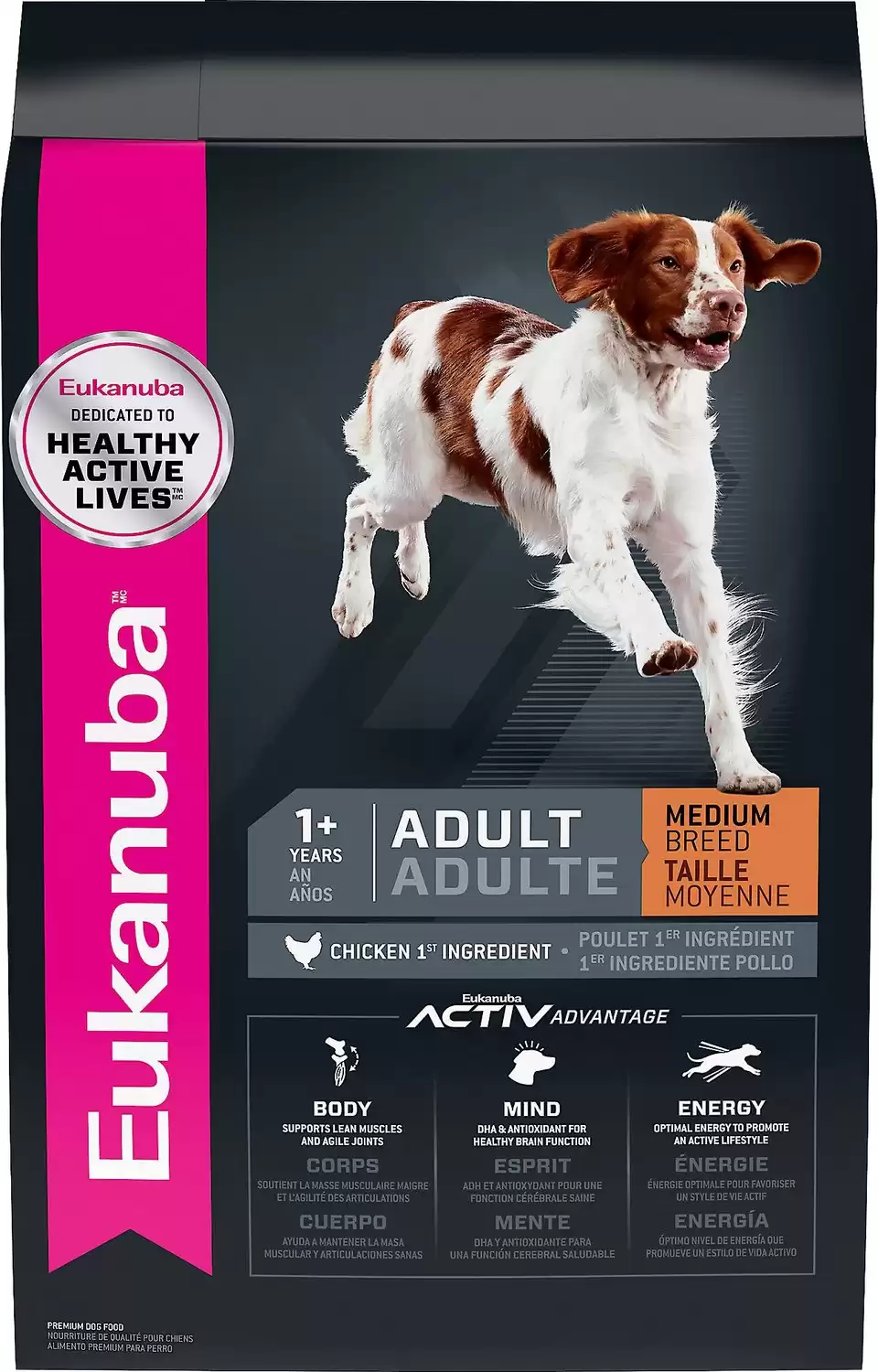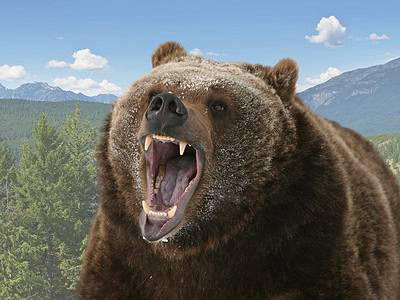Deutsche Bracke
Canis Lupus
Has long drop ears and a long narrow tail!
Advertisement
Deutsche Bracke Scientific Classification
- Kingdom
- Animalia
- Phylum
- Chordata
- Class
- Mammalia
- Order
- Carnivora
- Family
- Canidae
- Genus
- Canis
- Scientific Name
- Canis Lupus
Read our Complete Guide to Classification of Animals.
Deutsche Bracke Conservation Status
Deutsche Bracke Facts
Deutsche Bracke as a Pet:
- General Health
- Energy Level
- Shedability
- Trainability
- Intelligence
- Tendency to Chew
- Size
- Family and kid friendliness
- Yappiness / Barking
- Moderate
- Separation Anxiety
- High
- Preferred Temperature
- Average climate
- Exercise Needs
- High
- Friendly With Other Dogs
- Moderate
- Pure bred cost to own
- $400 and $600
- Dog group
- Working
- Male weight
- 35-40 lbs
- Female weight
- 35-40 lbs
This post may contain affiliate links to our partners like Chewy, Amazon, and others. Purchasing through these helps us further the A-Z Animals mission to educate about the world's species.
View all of the Deutsche Bracke images!
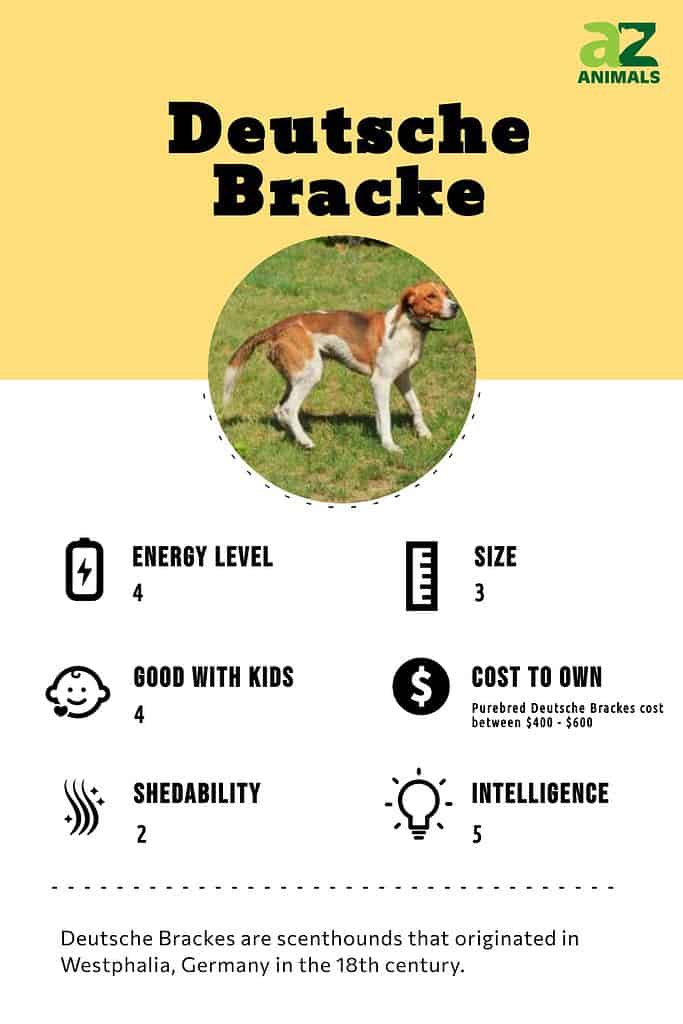
The Deutsche Bracke is a mid-size breed with a tricolor coat and a long tail. They are scenthounds that originated in Westphalia, Germany in the 18th century.
See all of our expert product reviews.
In 1896, all the different types of Bracke dogs (scenthounds) in Germany were merged into one breed that was named the Deutsche Bracke. Deutsche Brackes have also been called German Hounds, Westphalian Brackes, Olpe Brackes, and Sauerländer Brackes.
These are friendly and affectionate dogs. They are loving and very tolerant with children, making them an excellent family dog. Additionally, Deutsche Brackes are intelligent, obedient, and easy to train.
3 Pros and Cons of Owning Deutsche Brackes
| Pros! | Cons! |
|---|---|
| Healthy: Overall, these are very healthy dogs. It is less likely that you’ll have to deal with serious health concerns as you may with other breeds. | Roams: Deutsche Brackes have a stronger impulse to wander than some other dog breeds. You’ll want to make sure that your backyard is securely fenced and keep them on a leash for walks. |
| Easy to Groom and Maintain: Because Deutsche Brackes don’t shed very much. Their dense coats are very easy to maintain and you won’t need to worry about expensive grooming sessions with a professional groomer. | Need Company: Deutsche Brackes do not do very well when they are left alone. They are probably not the best dog breed for you if someone won’t be able to be home with the dog most of the time. |
| Good Family Dog: Deutsche Brackes are a great family dog. They do very well with children. They can also make a great companion dog for a senior citizen. | Allergies: Unlike some other dog breeds, Deutsche Brackes are not a hypoallergenic dog. They may aggravate the allergies of anyone in the home who is allergic to dogs. |
Evolution and Origins
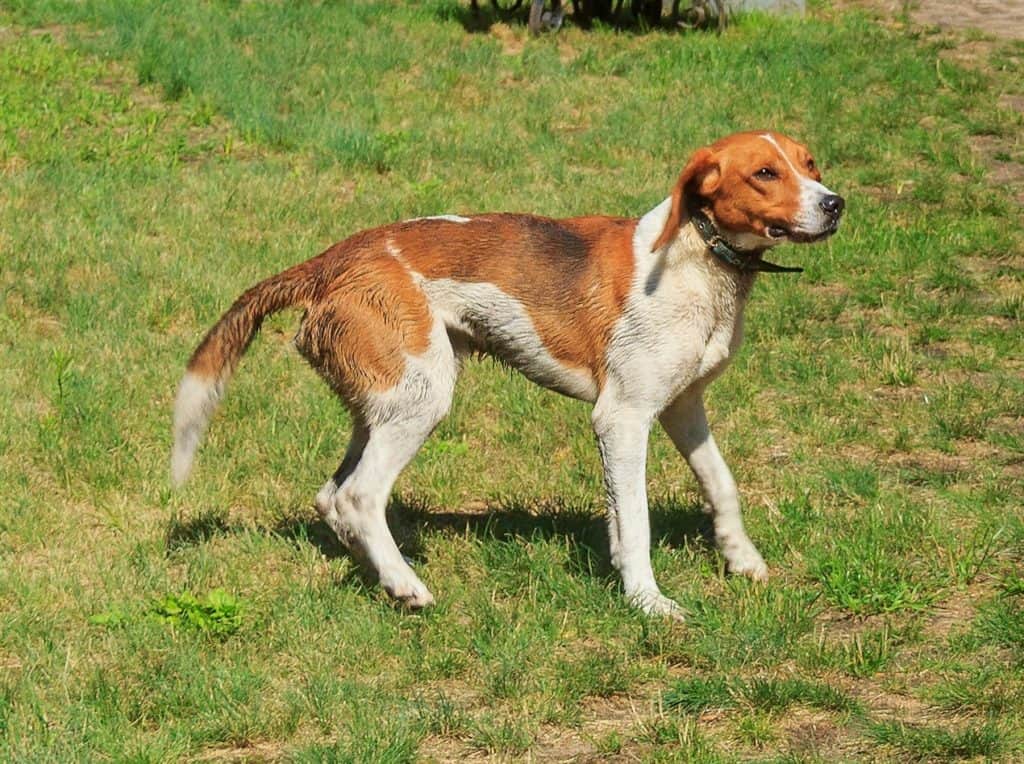
Deutsche Brackes were originally bred for hunting
©Studio MDF/Shutterstock.com
Previously Germany was home to several Bracken subspecies. However, with the passage of time, only the Westphalian Bracke remained. This breed was mixed with the Steinbracken for hunting purposes and as a result, the Deutsche Bracke came into being. Initially employed in hunting boar and rabbit, this dog has a rather sensitive nose and is rather sturdy and capable of enduring harsh conditions.
Health and Entertainment for your Deutsche Bracke
See all of our expert product reviews.
Size and Weight
Unlike some other breeds, there is not much difference between a male and a female. Both males and females typically weigh somewhere between 35 and 40 pounds. The average height for this breed is 18.5 inches, but they may be anywhere between 16 and 21 inches tall.
| Height (Male) | 16 inches to 21 inches |
| Height (Female) | 16 inches to 21 inches |
| Weight (Male) | 35 to 40 pounds |
| Weight (Female) | 35 to 40 pounds |
Common Health Issues
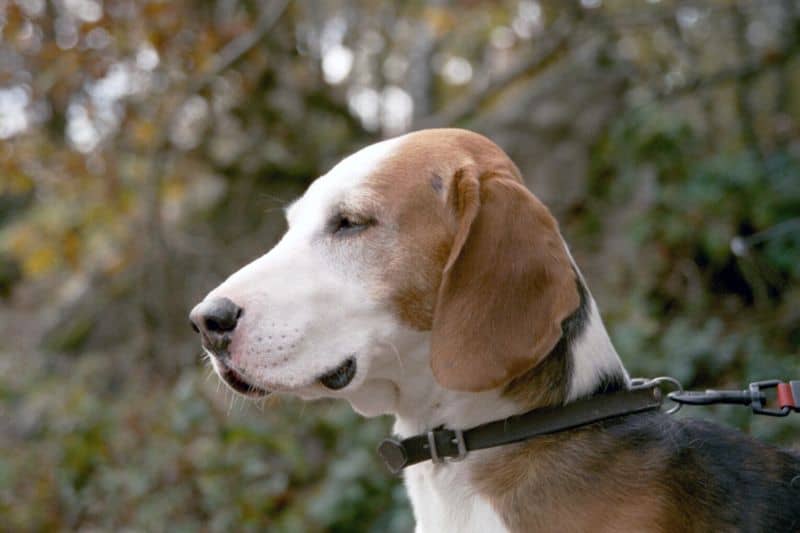
Members of this breed are prone to bloat owing to their deep chests
©Rumo / Creative Commons – Original
Overall, these are very healthy dogs. However, there are a few common health concerns that you should be aware of if you adopt this breed.
Deutsche Brackes have a deep chest. This puts them at risk for bloat. If a dog bloats, it means their stomach fills with gas and liquid and when you look at the dog, you’ll notice that their abdomen looks bloated, or enlarged. While the exact causes of bloat are not known, it often occurs in dogs who have completed a more vigorous activity shortly after eating a large meal.
Some of these breed may have their bloat progress to Gastric Dilation Volvulus (GDV). This is a condition in which the stomach rotates and traps the contents inside. This condition must be treated immediately by a veterinarian.
Cryptorchidism is a condition some male Deutsche Brackes may face. In this condition, either one or both of their testicles will not descend. The testicle(s) still in the body are ore prone to developing testicular cancer, so most veterinarians recommend removing the testicle to prevent this from occurring.
These dogs may also develop hip dysplasia. This is a condition in with the ball and socket joint at the hip aren’t formed correctly and rub against one another, wearing down the joint. This can be very painful for dogs and may cause them to limp. Therapies, medications, and, in some cases, surgery may be used to treat this condition.
Some Deutsche Brackes also develop glaucoma, progressive retinal atrophy, glaucoma, and other eye conditions. You should have your veterinarian check your dog regularly to catch these problems. It is also recommended to have Deutsche Brackes screened for eye problems before breeding, since these conditions can be hereditary.
To review, here are some of the main health concerns they face:
- Bloat
- Gastric Dilation Volvulus
- Cryptorchidism
- Hip Dysplasia
- Eye Problems
Temperament
These dogs have a very loving and affectionate personality. They enjoy interacting with their family and love getting lots of positive attention. However, they are also rather needy and rely heavily on their owners for attention. Without frequent attention, they may get into trouble or develop anxious behaviors.
Deutsche Brackes are also obedient dogs. With proper training and socialization, they will follow commands and act appropriately around children. Since their natural instinct is to hunt, you’ll want to be sure to train your dog if there are cats or other small animals in the house so he knows not to hunt them.
Another trait they exhibit is being very tolerant. This personality trait is another reason Deutsche Brackes is a good family dog; they are very good with children and can handle the slightly rougher handling of little hands.
How to Take Care of Deutsche Brackes
A Deutsche Bracke’s temperament, common health concerns, and other factors make this a very unique breed. If you are planning to adopt one of these dogs, you’ll want to take all of these factors into consideration as you plan for their care.
The Best Dog Food for Deutsche Brackes
When feeding your Deutsche Bracke adult dog or puppy, it is always important to look for high-quality foods that provide the balanced nutrition your dog needs to stay healthy and grow. They should not receive much, if any people food. It can lead to problems such as obesity, bone and tooth issues, and vitamin deficiencies. When Deutsche Brackes get too much people food, it can also cause them to become pickier eaters and turn their noses up at their dog food.
Puppies need to eat smaller meals multiple times a day because of their smaller stomachs. Puppies between the ages of 8 and 12 weeks should eat four small meals a day, puppies between the ages of 3 and 6 months should eat 3 small meals a day, and puppies between the ages of 6 months and 1 year should eat two meals each day.
Once your Deutsche Bracke is 1 year old, he can eat just one bowl of food each day. However, you may find that your dog prefers to eat 2 bowls, which is perfectly fine too. Adults should eat between 1.5 and 2 cups of food each day.
At A-Z Animals, we pick Eukanuba Adult Medium Breed Dry Dog Food as the best dog food for Deutsche Brackes.
A quality chicken formula, this dog food supplies your dog with glucosamine and chondroitin sulfate to help prevent conditions like hip dysplasia for endless walks and painless play. The beta-carotene is a useful component of eye health, and a blend of prebiotics and natural fiber from healthy grains benefits the digestive system.
Check Chewy or Amazon for this product.
- Adult medium breed dry dog food formulated with complete and balanced nutrition for medium breed dogs over 12 months old and weighing between 24-54 lb.
- Promotes lean muscle development and joint health in active adult dogs with a combination of animal protein, glucosamine, and chondroitin sulfate.
- Helps keep dogs sharp and supports healthy brain function with DHA and vitamin E.
- Fuels an active lifestyle with optimal levels of fats and carbohydrates.
- High-quality chicken is the first ingredient for protein that powers his day.
Maintenance and Grooming
Deutsche Brackes are a pretty low-maintenance dog. A few baths each year and regular brushing will keep them clean and reduce the amount they shed. You should also take care to keep your dog’s ears and eyes clean to prevent infections. Keeping up with the grooming needs for these dogs is simple; you should be able to take care of grooming on your own and won’t need to schedule professional grooming appointments.
Training
Training these dogs is relatively simple. This breed is naturally obedient and submissive to their owner. Additionally, they are very intelligent dogs but aren’t stubborn like many other hunting dogs, which helps make them easier to train. They do best with positive reinforcement and when their owner plans training sessions to be relatively short and interesting.
You can train a Deutsche Bracke to be a guard dog. They are attentive and alert and will bark at strangers.
Exercise
Making sure your dog gets plenty of exercise is important. They need physical activity both for their health and to keep their brain stimulated. Keeping your dog active also prevents them from becoming bored, which is when they may start to get into trouble.
Puppies

In addition to being fed small meals throughout the day, Deutsche Bracke puppies also need physical exercise
Females typically have a litter of five to eight puppies. If you are adopting one of these puppies, there are a few key things you’ll want to keep in mind. First, it will be important to begin training your dog as soon as you bring them home. This will help them learn expectations and help them adjust to living in your home. Once your dog has received his immunizations, you can begin looking for an obedience class to enroll them in.
Deutsche Bracke puppies need to eat smaller, more frequent meals throughout the day. You don’t want to feed them too much since their stomachs are still smaller and developing. See the Food and Diet section above for more information about feeding your new puppy.
It will also be important to make sure your puppy gets enough physical activity and playtime. Take them for walks, allow them to run in a fenced-in yard, and play with them to help them get the physical activity they need.
Once you come home with your new puppy, you’ll also want to schedule an appointment with the veterinarian. Your veterinarian can perform an examination on your dog to make sure there are no health issues you need to be aware of.
Children
These dogs can be a great family dog to have around children. They are very tolerant, loving, and know how to be kind to young children. Additionally, they are very obedient dogs, so they will follow their owner’s commands in regards to playing with children.
Providing a Deutsche Bracke puppy with proper socialization and training from a young age will help prepare him to act appropriately with young children. It is also always important to make sure children know how to correctly interact with and treat a dog to avoid any accidental injuries.
Dogs similar to Deutsche Brackes
The Drever, Beagle, and American Foxhound are three dog breeds that share some similarities with the these dogs.
- Drever: Drevers and Deutsche Brackes are both hunting dogs. Drevers originated from Sweden, while Deutsche Brackes originated from Germany. Both dogs are social and affectionate. Unlike a Drever, a Deutsche Bracke can be a good dog to be a watchdog.
- Beagle: A Beagle is another dog that was bred to be a hunting dog, specifically a scenthound like the Deutsche Bracke. One key difference between a Beagle and a Deutsche Bracke is their size. Beagles are smaller. They typically weigh between 20 and 25 pounds and are around 14 to 15 inches tall. On the other hand, a Deutsche Bracke weighs between 35 and 40 pounds and is between 16 and 21 inches tall. Both dogs are easy to playful and easy to train.
- American Foxhound: American Foxhounds are also hunting dogs. Like the Deutsche Bracke, they are affectionate and social dogs. Deutsche Brackes are more territorial and tend to have fewer health concerns than American Foxhounds.
Popular Names for Deutsche Bracke
If you’re looking for the perfect name for your German Hound or Deutsche Bracke, below are some ideas to consider:
- Max
- Sam
- Ollie
- Rocky
- Charlie
- Lilly
- Callie
- Maddie
- Dixie
- Chloe
- Layla
Deutsche Bracke FAQs (Frequently Asked Questions)
How much does a Deutsche Bracke cost to own?
Adoption costs for Deutsche Brackes can vary, but they are typically between $400 and $600 a year. In addition to the cost of adopting your dog and completing any necessary paperwork, you will also want to be sure to budget for medical check-ups and treatment, food, toys, and supplies for your dog. This typically costs between $400 and $780 each year but could be more if there are any unexpected vet bills.
Are Deutsche Brackes good with kids?
Yes, Deutsche Brackes are great with kids. It will be best to make sure your dog gets trained from an early age and receives socialization with other dogs, adults, and children. Deutsche Brackes are very tolerant, so they are more likely to put up with the more ‘aggressive’ petting a child might engage in.
How long does a Deutsche Bracke live?
Deutsche Brackes have a lifespan of between 10 and 12 years.
What is the scientific name for a Deutsche Bracke?
The scientific name for the Deutsche Bracke is Canis Lupus.
Are Deutsche Brackes easy to train?
Yes, Deutsche Brackes are pretty easy to train. It is best to start training from an early age, but this breed is very obedient and naturally submissive to their owners. Positive reinforcement works better than other training methods with Deutsche Brackes.
Where did Deutsche Brackes originate?
The Deutsche Bracke’s origins go all the way back to the 18th century. They were originally found in Westphalia, Germany.
How big do Deutsche Bracke dogs get?
Deutsche Brackes weigh between 35 and 40 pounds. They have an average height of 18.5 inches but may be anywhere between 16 and 21 inches tall.
Are Deutsche Brackes friendly?
Yes, Deutsche Brackes are very friendly dogs. They are known for being very affectionate with their family members and for being tolerant and kind to children.
Are Deutsche Brackes herbivores, carnivores, or omnivores?
Deutsche Brackes are Omnivores, meaning they eat both plants and other animals.
What Kingdom do Deutsche Brackes belong to?
Deutsche Brackes belong to the Kingdom Animalia.
What class do Deutsche Brackes belong to?
Deutsche Brackes belong to the class Mammalia.
What phylum to Deutsche Brackes belong to?
Deutsche Brackes belong to the phylum Chordata.
What family do Deutsche Brackes belong to?
Deutsche Brackes belong to the family Canidae.
What order do Deutsche Brackes belong to?
Deutsche Brackes belong to the order Carnivora.
What genus do Deutsche Brackes belong to?
Deutsche Brackes belong to the genus Canis.
What type of covering do Deutsche Brackes have?
Deutsche Brackes are covered in Hair.
What is an interesting fact about Deutsche Brackes?
Deutsche Brackes have long drop ears and a long narrow tail!
Thank you for reading! Have some feedback for us? Contact the AZ Animals editorial team.
Sources
- David Burnie, Dorling Kindersley (2011) Animal, The Definitive Visual Guide To The World's Wildlife / Accessed December 1, 2008
- Tom Jackson, Lorenz Books (2007) The World Encyclopedia Of Animals / Accessed December 1, 2008
- David Burnie, Kingfisher (2011) The Kingfisher Animal Encyclopedia / Accessed December 1, 2008
- David Burnie, Dorling Kindersley (2008) Illustrated Encyclopedia Of Animals / Accessed December 1, 2008
- Dorling Kindersley (2006) Dorling Kindersley Encyclopedia Of Animals / Accessed December 1, 2008
- Wikipedia / Accessed October 30, 2020
- Wag! / Accessed October 30, 2020
- Dogzone / Accessed October 30, 2020
- Planetfauna / Accessed October 30, 2020






